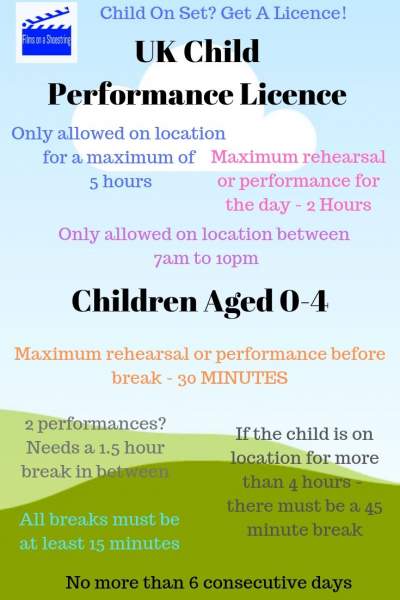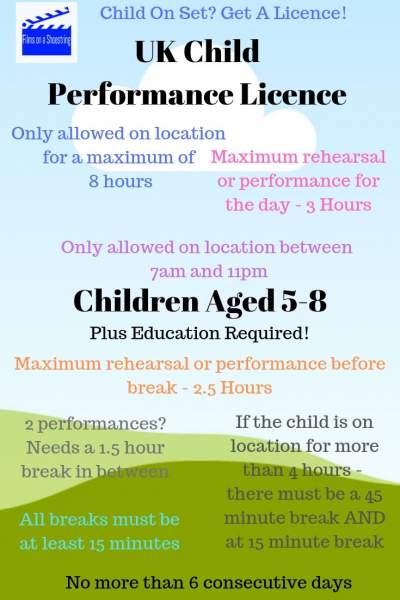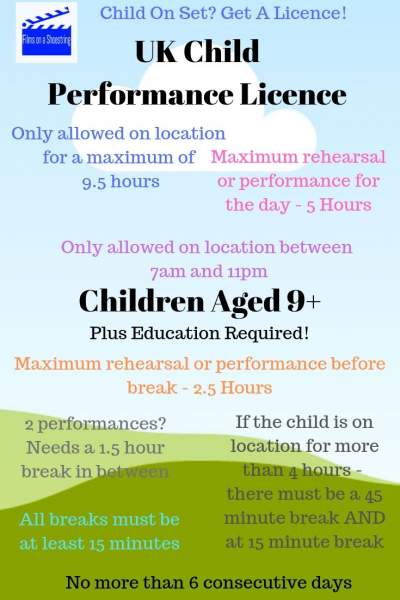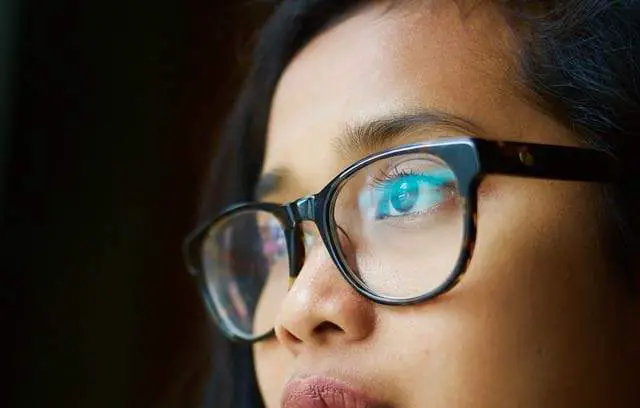Child Performance Licence Regulations protect child actors and models in the UK. But parents and filmmakers rarely understand their responsibilities under the law. And now Local Authority cuts and disorganised production teams are straining an already outdated system. We take a look at some of the UK’s Child Performance Licence regulation issues.
What Are The Child Performance Licence Rules?
With little training at film school on this ESSENTIAL piece of legislation, we’ll start by setting out the rules.
The relevant law is The Children and Young Persons Act 1963 s37 and The Children (Performance and Activities) (England) Regulations 2014:
- Nearly all children must be licensed, even if it’s unpaid and out of school hours
- It affects stage, screen, Youtube videos, and even student films
- The rules are different according to the child’s age
Unfortunately, many people are unaware of the law when they make a short film, and do not safeguard children on their set.

Why Do We Need Licences For Performing Children?
In October 2017, a 14-year-old Russian model died after collapsing at a fashion show in China. It is alleged that Vlada Dzyuba had worked a 12 hour in Shanghai whilst ill from bacterial meningitis. There are various claims that she was too scared to ask for medical help and that her medical insurance cover had not been secured. Her mother was back home in Russia. There does not appear to have been a chaperone keeping her safe from harm and exploitation.
The child model’s avoidable death has happened at the same time the entertainment industry has had to face up to the astounding degree of bullying and sexual exploitation that has been permitted for decades. It is hard to read the 2008 article in The Independent about Roman Polanski without wondering why sex with a child is so hard to condemn. The 1981 Washington Post article about naked pictures of 10-year-old Brooke Shields ends up blaming the underage actress for work she did, whilst ignoring any comment about who commissioned the various named projects or why the public only wanted to see her as a sex object. The industry ignored Harvey Weinstein’s behaviour for decades, while lawyers and investigators are alleged to have investigated anyone attempting to speak out about him.
And we all now know what Sir Jimmy Savile was like around children and vulnerable young women.

Which Child Actors And Models Need Licences In The UK?
Any child who is going to make an appearance for filming or a paying audience, with very few exceptions, needs to be licenced before attending the venue for rehearsals or performance.
Once the child reaches the last Friday of June following their 16th birthday, they are no longer classed as a child for licensing purposes. This used to be the school leaving age, but the education law has changed.
How Do You Receive a Child Performance Licence?
- The production team completes Part I and submits it to the relevant Licensing Officer. This person will be located in the Local Authority for the area in which the child lives.
- The parents complete Part II and the Health Declaration. They also provide the passport style photos and the long birth certificate. Normally they submit these documents to the production team, who forward them to the Licensing Officer.
- If they agree, the school gives written permission for the child’s absence from education for the specified school sessions.
- In the application, the production team identify the appointed chaperones. The only persons legally permitted to chaperone are parents and Licensed Chaperones.
- Normally all the documents are completed in hard copy and then scanned, or completed directly to an emailed proforma. It is extremely rare for anyone to collect a pile of physical paperwork.
The documents are supposed to be submitted at least 21 days before the performance. Some councils have imposed charges for anyone wanting a licence with less notice.
The Licensing Officer processes the paperwork and then sends a letter to the production team, school and parents. The letter will set out the licence terms and conditions. The licence must be issued before the child attends the first rehearsal or shoot day.
Sometimes Licensing Officers may visit the place of production to check on the child’s welfare.

There Is A Different Procedure For Child Actors And Models Working Abroad
The procedure for performance work abroad is completely different and requires court approval. The process is rarely understood beyond a few experienced professionals. This means children sometimes lose work because the required signatures are not obtained in time.
Why Isn’t The UK Child Licensing System Working Well?
Years ago, children rarely did performance work beyond their local area. Touring productions would recruit local children, as would TV productions. This has changed beyond all recognition.
Today, nearly all castings take place in London or Manchester, regardless of where the child comes from or where they will be performing.
This means children can come from one area, work on set in another area, and have temporary accommodation in a third area. And every single one of those areas will have a different Licensing Officer, with the licence only being issued by the authority for the area in which the child ordinarily lives. If a problem occurs, it can cause a real mess as to which authority should be involved, assuming they even know the event has happened.
Meanwhile, Local Authorities are genuinely struggling. They have had billions of pounds to cut back from local services while care needs and costs spiral.
The Licensing officer is now usually the only one in the authority who can process the licences. When they are absent, there is rarely staff cover. This includes sickness, holidays and working on other important tasks.
The Licensing Officer’s duty is to issue the licence within 21 days. But the application usually arrives days, or even hours, before filming. This is an age where many casting directors expect agents to work every hour they are awake; castings are the same or next day; frequently the shoot will start within five days. No one will wait for a licence.
As far as the production team is concerned, all they need to do is hedge their bets by pencilling several children for a job and then seeing whose licence comes in first.
Child Licensing Has Become A Postcode Lottery
Obviously, this is deeply frustrating for families who have rearranged work and other family commitments; paid for expensive last-minute train fares to castings; waited nervously for casting outcomes; begged the school for time off and a fast letter of approval; then frantically completed the licensing paperwork as fast as they can.
It is opening up a postcode lottery for the children involved. Many casting directors and agents now keep their own lists as to which authorities are faster or slower than others. Some children miss out on jobs because of where they live.
And it’s going to get worse. Local Authorities struggle to meet statutory provision for their local populations. Care costs increase as budgets contract. Therefore, they have no interest in protecting the acting careers of the children in their areas by providing a fast, free licensing service.
Many Filmmakers Ignore Child Performance Licence Regulation
In an age where a lot of unpaid jobs for micro-budget films are advertised on social media sites, a lot of people are ignoring child performance licence regulations. Frequently this is due to lack of knowledge. Some Local Authorities don’t even have relevant web pages about the topic. Film schools usually forget to teach their students about this significant piece of legislation.
But it’s not just micro-budgets at fault. A number of well-known casting sites advertise briefs which ask for “open licences” (which do not exist). Many give information or deadlines which suggest they won’t be applying for licences. The casting sites can stop this, but they have little incentive to scare away the advertisers providing work to their paying customers.
Licensing Officers Don’t Police Bad Casting Briefs
Meanwhile, the Licensing Officers aren’t watching these worrying briefs. Why?
- The adverts rarely give the location for the shoot
- With 33 Local Authorities in London, which one would respond to a shoot advertised in London?
- If each of the Licensing Officers is already struggling to cope with their workload, they really don’t have time to be trawling adverts
- The child’s home address, not shoot location, determines the responsible Licensing Officer
How Could The System Improve?
There have been repeated attempts over the past few years for the child performance licences to be issued by one central body. There are sound reasons to do so:
- One dedicated team for the whole country would mean all children would have equal access to licences regardless of where they live
- The team would be more efficient and cost less than the licensing officers scattered across hundreds of councils
- Parents and Producers email documents and evidence
- Licensing officers working from home would reduce office costs
- A dedicated officer could randomly inspect venues across the country
- A dedicated team could monitor casting websites and social media, and respond to concerns raised by the public
- An advertising or social media outreach campaign would inform everyone in the performance field about their legal obligations
- In a better system, parents would be happy with the regulations to cover young people until they are 18
But Parents Must Remain Alert
Please remember that the licences only cover rehearsals, performances, and filming. Children and young people pursuing an acting career can have a lot of off-set exposure to adults they don’t know.
A licence is not issued for a casting; but parents wait outside the audition room. It’s a difficult balancing act because if you are seen as a pushy parent, you end up on unofficial blacklists and your child will not get the work they love. But at the same time, you do not want any harm to come to your child as you sit outside. You need to make a decision for each casting environment. Responsible casting directors will know and follow good safeguarding practices. You cannot assume the same for a micro-budget filmmaker casting from their flat. In all situations, your child must know that they can leave the room whenever they are uncomfortable with the situation they are in.
Parties and other social occasions can also be a danger to children. Drew Barrymore had drug and alcohol problems even before she reached her teens. You have to wonder why 14-year-old Anthony Rapp was left bored and alone in Kevin Spacey’s bedroom while the adults partied nearby. Attend and stay with your child at all times. Alternatively, appoint a licenced chaperone who will be there solely to look after your child.
Life After Licensing Means End Of Child Protection
Many parents breathe a sigh of relief when their child reaches the age to end licensing. But of course, this means the predators can move in on young, easily manipulated young people without worrying about the age of consent. Most 16 to 18-year-olds are very naive. Casting sites regularly state the young actor will be naked or topless, even for unpaid roles. Jennifer Lawrence and Sarah Solemani have both spoken out about the casting process that leaves young people vulnerable to exploitation and humiliation at a point in life where they are given the choice between complying or losing their careers.
Will the current Weinstein allegations help the industry improve attitudes and practice? Or will it be business as usual as soon once the public gaze has moved away again? In the meantime, appreciate the Child Performance Licence Regulations while it is there to protect your child. But we would like it to be even better.

